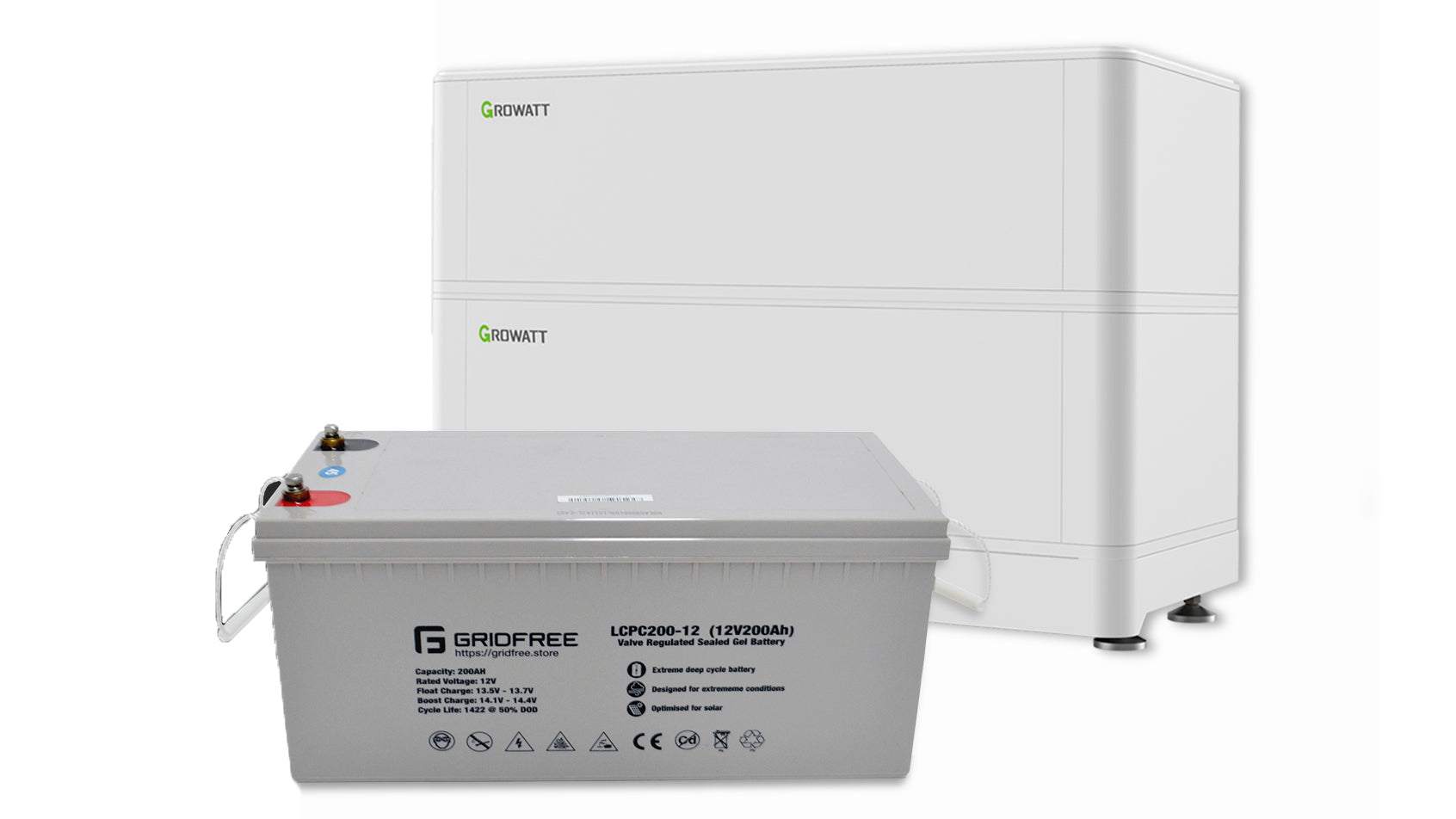What is the best battery for off-grid solar?
Wondering what is the best battery for off-grid solar? Our standard 200Ah Gel Deep Cycle Battery is a workhorse that is popular with our customers and offers a balance of being a great battery at an affordable price with a lifespan of 3-7 years if treated good to well.
Not all batteries for off-grid are the same. We have three kinds of batteries available as stand-alone purchases or as part of our off grid solar system packages with batteries. Our standard 200Ah Gel Deep Cycle Battery is a workhorse that is popular with our customers offers a balance of being a great battery at an affordable price, with the shortest lifespan of 3-7 years if treated good to well. This battery is 60kg and has a 50% usable depth of discharge. It's safe and compatible with almost all charge controllers and inverters. Then we have Lithium Ion Batteries—the Growatt ARK LiFePO4 Battery 2.56kWh with a 10-15 year lifespan, clocking in at 30kg each, and with an 80% usable depth of discharge. Learn more about the differences between these three battery types.
Can you run a solar system without batteries?
The short answer is yes - but not off-grid. Typically residential/inner city/suburban solar systems generally don't come with batteries, but that means if there's a power cut, you don't have power. To use solar power off-grid you absolutely need batteries, otherwise you have no power overnight or when the sun's not shining, and the power will fluctuate. We recommend a deep cycle battery, as they're designed for the specific needs of a solar power system.
How do batteries help optimize power obtained by solar?
Batteries store your power so you can use it all the times when the sun isn't shining brightly. They store it at 12/24/48V (depending on your battery bank), which can then be used at the voltage you need. A deep cycle battery bank allows you to have a stable and constant source of power that you can draw from, whereas if you're pulling straight off a solar panel the power goes up and down wildly. Batteries allow you any-time power, and reliable power.
What is the best deep cycle battery for solar and are there good ways to maintain batteries?
There are variety of solar batteries are available, such as lead acid or lead carbon, and lithium. Choosing the right battery type is typically a trade-off of capacity, longevity, and price, and you can read our breakdown here. Our standard option is a deep cycle lead acid gel battery, and offers great bang for buck against other options. It is maintenance-free, but you still want to take care of it to extend it's longevity. Some good tips to help keep your battery in good shape: don't let it get too hot or too cold, keep it out of the weather, and don't discharge it too deeply.
Your battery has a certain amount of useable capacity; you don't want to draw down more than 50% with these batteries, because once you get past that certain chemical processes happen in the battery that shortens its lifespan. A few times is okay, and 49% is not the magic number where damage starts, but it's best practice to stay above 50%. More importantly, don't let them sit partially charged for more than a day if you can avoid it. The aim is to keep them fully charged as often as possible to keep them lasting as long as they can. Each battery is different, so follow the manufacturer's guidelines for discharging batteries.
When do you know you need more panels / batteries?
You know you need more panels when you find yourself not able to recharge batteries adequately even after normal usage. You likely need more batteries if you wake up in the morning and the batteries have been discharged overnight below 50% - though we recommend adding more panels at the same time, to ensure you are able to adequately recharge them each day. Another reason would be you start needing to use more power and need more of both panels and batteries. Learn more about expanding.
Battery capacity degrades over time, so you will likely need to look at getting your batteries replaced 3-5 years down the track to continue at the same level of power usage (with Lead Acid batteries).
How Long Do Off Grid Batteries Last?
There is no one answer to the question how long do off-grid batteries last. A Lead-Acid Battery has a lifespan of 3-7 years, depending on the specific battery and usage. A Lithium-Ion Battery is designed with a 10-15 year life expectancy, and has a bigger upfront cost, but is more economical in the long term.


